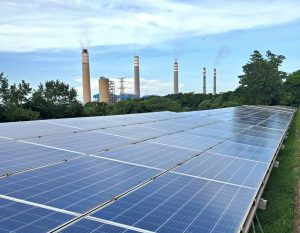Southeast Asian companies have a huge opportunity to tap into new finance, investment, and manufacturing potential in the region and lead the global clean economy by disclosing climate emissions and putting transition plans in place.
Following the successful implementation of the Transition Plan Taskforce (TPT) framework in the United Kingdom and Europe, it is ready to extend into Southeast Asia, and businesses are being encouraged to get on board.
Yet, many Asian countries are wary of the push to implement transition plans. Even middle-income economies such as Japan, perceive the plans as premature and requiring significant resources that impose a heavy financial burden.
The majority of the world’s emissions come from the corporate sector. Business as usual in the face of accelerating climate change is not an option.
However, transforming the mindset of Southeast Asian businesses to embrace transition plans and see the potential financial benefits cannot be done instantly. Nor can the transition happen at the same pace as for their Western counterparts, who start from a significant advantage.
The Southeast Asian Experience
When advocating for climate transitions in low-income countries, it is crucial to consider their diverse economic structures and vulnerabilities. This is particularly evident in the growing body of research around equitable transitions and how we go about fairly distributing both the costs and the benefits of the move. This is a significant consideration when looking at Southeast Asian businesses.
Southeast Asia will be disproportionately affected by the impacts of climate change due to its low adaptive capabilities. This underscores the need for a just and inclusive transition that includes considered, tailored support for the region’s climate transition plans.
Many low-to-middle-income economies require help to keep up with the timeline and the number of new climate disclosure standards and transition frameworks published. The Association of Southeast Asian Nations (ASEAN) Capital Markets Forum reports that while an increasing number of businesses in emerging economies report their emissions, they are often incomplete and inconsistent in emission scopes, which refer to the different types of greenhouse gases and the sources of emissions that are included in a company’s reporting.
As new climate transition plan standards and frameworks demand more detail, limitations in technical capacity and data availability become significant barriers for businesses in low-to-middle income countries. However, with tailored support that addresses regional challenges, these barriers can be overcome, enabling these countries to present or build upon the data required for their climate transition plans.
There has been some effort to contextualise global standards in the Southeast Asian business ecosystem; one example is Capital Market Malaysia’s Transition Strategy Toolkit. The toolkit considers the lack of technical expertise in ASEAN countries, providing clear information on climate transition plans and practical guidance on how to meet these standards in a specific Southeast Asian context.
Importantly, companies can view their transition plan as a potential means of securing sustainable finance and green project financing. A transition plan framework for different sectors could prompt the financial sector to be more mindful of its funding plan, thereby enhancing the prospects of a successful corporate transition. For instance, companies that align their transition plans with the global TPT framework may be more attractive to investors and lenders who prioritize sustainable investments.
Indonesia’s Promising First Step
Indonesia has just released its updated version of the Indonesia Taxonomy for Sustainable Finance, a tool that allows businesses to work towards developing their transition pathways by giving them access to green project financing. This vision can be a starting point for encouraging the banking sector to develop its green finance products, and create a more sustainable financial ecosystem for businesses in the region.
The next step is ensuring that tailored technical training is provided to ensure Southeast Asian countries, like Indonesia, can keep up. This emphasis on tailored support and understanding unique challenges is crucial to making businesses feel understood and valued in their efforts towards a net-zero economy.
Ultimately, whatever path is taken, the additional burdens should not be imposed on struggling economies. This is not a one-size-fits-all global challenge.
Recommendations
We can shift the narrative to how climate transition plans are viewed in Southeast Asia. This is an opportunity for businesses and the finance sector. Those that act now stand to gain from market share, reduced costs, talent retention, and many other benefits as the world races towards net-zero emissions.
Even in the early stages, transition plans and the disclosure of climate information provide a signal to investors that a business is striving to meet global climate requirements, therefore adding to its credibility. With the recent surge in interest in transition finance, this global movement could open the door to new funding and investment, fostering a sense of optimism and motivation for Southeast Asian companies.
First, we must begin acknowledging that Southeast Asian economies have a different starting point from their Western counterparts. They might not be able to progress at the same speed as other countries such as the United States or Australia, but they are working towards the same net-zero goal.

































